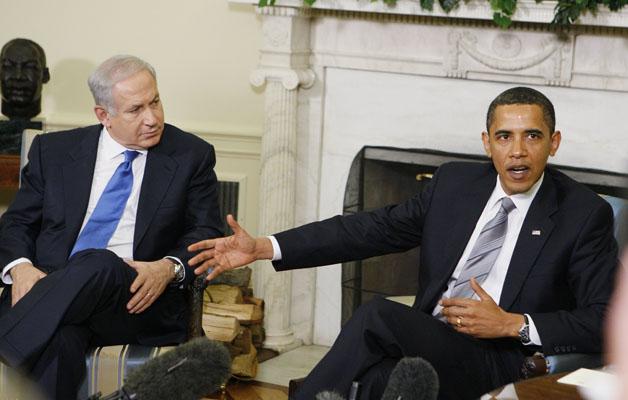The experts who said Israeli Prime Minister Benjamin Netanyahu was vulnerable before yesterday’s national election insisted that the vote was a referendum on him. His overwhelming victory shows that it was equally a referendum on U.S. President Barack Obama. Netanyahu gave voters a choice between whom to trust more with their nation’s security. The result was clear.
To understand how the political dynamics played out, consider Netanyahu’s comments on the eve of the vote. Asked in an interview with the right-leaning website NRG if there was any chance for a Palestinian state under another Netanyahu government, he declared there was none.
Lots of journalists and analysts saw it as a reversal of the prime minister’s speech in 2009 at Bar Ilan University, in which he laid out his vision for a demilitarized Palestinian nation. But the context here is important. Netanyahu prefaced his answer by stating something very obvious: “I think that anyone who is going to establish a Palestinian state today and evacuate lands is giving attack grounds to the radical Islam against the state of Israel.”
This was not fear-mongering. It was something Israelis have been grappling with for a decade. Following then-prime minister Ariel Sharon’s decision to unilaterally uproot Jewish settlements and remove troops from Gaza in 2005, Hamas took over the territory. It didn’t happen all at once. But after Hamas won parliamentary elections in 2006 and the Fatah faction of the Palestinian Authority refused to seat its ministers, Hamas fighters expelled the Fatah loyalists from Gaza’s security agencies and took control of the territory.
Since then, Hamas has spent most of its resources preparing for battle. There have been three Gaza wars since the Sharon pullout, and most Israelis fear that a similar withdrawal from the West Bank would yield the same results. This concern has increased over the last year as Palestinian Authority President Mahmoud Abbas — Israel’s peace partner — has been trying form a unity government with Hamas, a jihadist organization committed to Israel’s destruction.
Of course, Israel and Netanyahu are not blameless in this. Netanyahu’s failure to curb settlement growth in the West Bank has convinced Palestinians that they have no Israeli partner. The Israeli presence in the West Bank has resulted in the detention of thousands of Palestinians — many of them in the teens.
But only a sliver of Jewish Israelis support an unconditional withdrawal from that territory. Even Netanyahu’s center-left opposition, the Zionist Union, has abandoned the idea of a unilateral pullout. In their campaign, its leaders promised to pursue negotiations, but didn’t promise to cede any territory Israel won in the 1967 war or to re-divide Israel’s capital, Jerusalem.
Looking ahead, it’s important to consider a much-ignored part of Netanyahu’s NRG interview. He said he anticipated renewed international pressure to force an Israeli withdrawal from the West Bank. If so, the question is whether the U.S. will join in, pushing Israel to abandon the West Bank. As Democratic Representative Adam Schiff suggested on CNN, if the White House interprets Netanyahu’s pre-election statement as a new Israeli policy, the U.S. could decide not to veto a future U.N. Security resolution recognizing Palestinian statehood.
But these hypotheticals are overblown. Netanyahu is a politician. Politicians say all kinds of things in campaign mode that they don’t end up doing when they govern. Netanyahu opposed a two-state solution in the 1990s, but as prime minister he signed the Wye River Accords, which built up the Palestinian Authority’s security services and further committed Israel to a two-state solution. Netanyahu campaigned in 2008 against Sharon’s unilateral withdrawal from Gaza, but then gave the Bar Ilan speech in 2009 and agreed to a partial settlement freeze at the request of the White House.
Obama is also a politician. In 2012 he said he wasn’t bluffing when he pledged he would not allow Iran to acquire a nuclear weapon. Netanyahu campaigned on the simple message that Obama was indeed bluffing. The deal Obama’s diplomats are now trying to close would likely leave Iran in possession of thousands of centrifuges and expire in 10 years. Yes, there would be increased monitoring of its nuclear program, but Iran would remain a threshold nuclear state, capable of using its infrastructure to make a bomb when it saw fit.
That’s something neither Netanyahu nor his opposition could accept. The Zionist Union skewered Netanyahu for taking his grievances with Obama public, saying his alienation of Obama was partly to blame for the bad nuclear deal. Netanyahu turned this attack on its head. In his Washington speech this month he warned Congress about Obama’s diplomacy. At home, he accused the opposition of lacking the fortitude to stand up to an American president who was willing to sacrifice Israel’s security for a legacy agreement with Iran.
Netanyahu’s political instincts were correct. In re-electing him, a large plurality of Israelis agreed that Obama is not to be trusted. The question now for Obama is whether he thinks Netanyahu was bluffing or telling the truth in his pre-election interview. I suppose it all comes down to a matter of trust.
http://www.bloombergview.com/articles/2015-03-18/israel-chose-bibi-over-barack









